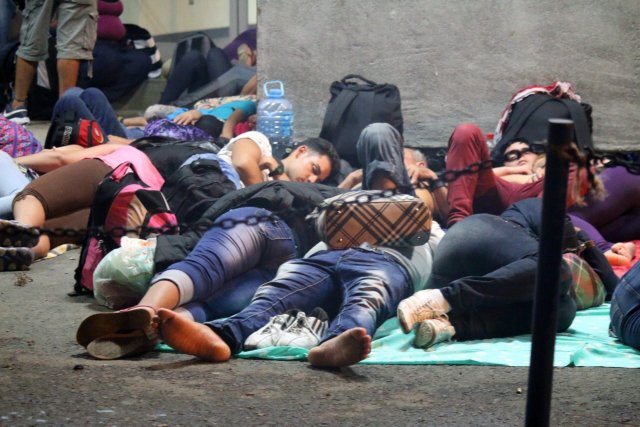Julio, the hero in Carlos Fonseca’s novel “Austral,” has a much better life than the migrants stranded in Costa Rica, and yet he also struggles with his fate.
Photo: EPA/Alvaro Sánchez
Julio did it. As a young man, he escaped poverty in Costa Rica with a scholarship. While his brother slipped into gang crime, he received his doctorate in the USA and received a professorship in literature there. However, when he looks back on the last 30 years, he feels not happiness but loss. What is he lacking? It is the home he longs for. Although there is nothing and no one waiting for him in the south, he now speaks better English than Spanish, and yet he still wants to go back. His wife doesn’t want to hear about it; after an argument, she flies to France to be with her family. So Julio spends the Christmas holidays alone and a letter bursts into the middle of his identity crisis. It says that his childhood sweetheart, the writer Alicia Abravanel, has died. And that it was her last wish that he take care of the publication of her last manuscript.
All of this is told in just a few pages, but Carlos Fonseca’s novel “Austral” takes time for what comes next. For Julio, it’s a good opportunity to leave the routine in Michigan behind. In the following he wanders across the South American continent and at the same time reads through the enigmatic novel fragment. In it, Alicia talks about a continuum of European fascination with South America. Friedrich Nietzsche’s sister once traveled overseas with her husband to found the Nueva Germania settlement in Paraguay. Decades later, a man from Germany comes to this place again, but he is not interested in the remaining Germans, but in the last indigenous people of a people. He desperately wants to preserve his language and perishes because he doesn’t succeed. Alicia’s father is also unsuccessful, so she has to go to South America herself.
Here the plot meets that of the novel within the novel. In 1982, Alicia fell in love with Julio, and before he left Costa Rica, they drove together through South America torn by violence and crises. Alicia is pursuing a mission with this trip. Her role model is director Werner Herzog, who traveled from Munich to Paris in the winter of 1974, where he wanted to visit his mentor Lotte Eisner, who was seriously ill. With his pilgrimage he wanted to bring about their healing. Magical thinking works here and there, as if the world could become a different one if one just moved within it.
Alicia is also about healing, or at least about acknowledging the suffering of others, seeing them in their pain. And like Herzog, she is an artist, while her companion is just a budding literary scholar. Only? Yes, because why else would he abandon the road trip, break up with Alicia and escape into an academic life? But certainly because he lacks the ultimate determination, the courage to face the stark reality and adapt to it. And so, three decades later, he only has the art of others to finally arrive at insights that are quite profound. In his third novel, Fonseca is concerned with the definition of what we awkwardly call reality, its relationship to language, the nature of the past and the question of how one can live and remember at the same time.
At times the author gets carried away with his themes, for example when he confuses literary depth with the weight of meaning of concepts. In his unconditional belief in art and literature, the author, born in 1987, also proves to be a supporter of surprisingly old-fashioned poetics. Many writers of his generation would certainly tell of this formative journey very differently. As a story about presumption and appropriation, in which a snobby English woman accuses a young man from Costa Rica of not feeling the desire for misery tourism.
But Fonseca has no interest in matters of identity politics, just as he is not actually concerned with politics, but only with the direct effects of power: with the violence, with the expulsion, with the fire that engulfed an entire village. And to find the opportunity to orientate oneself again, to find an agreement with the world, to wrest a place for oneself from it. Julio also finds stability again by remembering what really happened back then between Alicia and him and what he did was lost with her. For him, literature is a vehicle for liberation and should be exactly that for readers. This celebration of art sometimes becomes quite pathetic, but one also commands respect for the matter-of-factness with which the author elevates it to the throne.
Carlos Fonseca: Austral. Wagenbach, 192 S., br., 22 €.
#ndstays – Get active and order a promotional package
Regardless of whether it is pubs, cafés, festivals or other meeting places – we want to become more visible and reach everyone who values independent journalism with an attitude. We have put together a campaign package with stickers, flyers, posters and buttons that you can use to get active and support your newspaper.
To the promotional package
